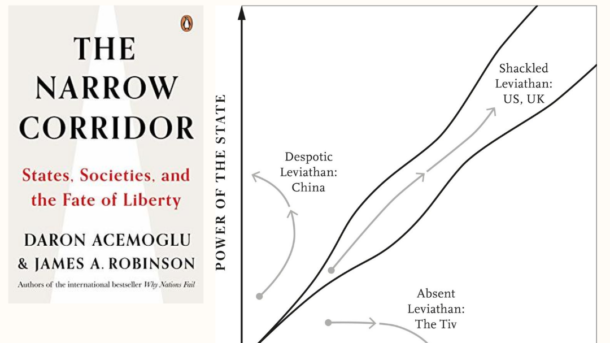This book is about liberty. Liberty depends on the different types of Leviathans and their evolution—whether a society will live without an effective state, put up with a despotic one, or manage to forge a balance of power that opens the way for the emergence of a Shackled Leviathan and the gradual flourishing of liberty. In contrast to Hobbes’s vision of society submitting its will to the Leviathan, which much of social science and the modern world order take for granted, it is fundamental to our theory that Leviathans are not always welcomed with open arms and their path is a rocky one, to say the least. In many instances society will resist their ascendancy and will do so successfully, just like the Tiv did and the Lebanese still do. The result of this resistance is illiberty. When this resistance crumbles, we may end up with a Despotic Leviathan, which looks a lot like the sea monster that Hobbes imagined. But this Leviathan, though it prevents Warre, does not necessarily make its subjects’ lives much richer than the “nasty, brutish, and short” existence that people eke out under the Absent Leviathan. Nor do its subjects really “submit their wills” to the Leviathan—any more than East Europeans chanting the “Internationale” in the streets before the collapse of the Berlin Wall really submitted their wills to Soviet Russia. The implications for citizens are different in some ways, but still there is no liberty. A very different type of Leviathan, a shackled one, emerges when there is a balance between its power and society’s capacity to control it. This is the Leviathan that can resolve conflicts fairly, provide public services and economic opportunities, and prevent dominance, laying down the basic foundations of liberty. This is the Leviathan that people, believing that they can control it, trust and cooperate with and allow to increase its capacity. This is the Leviathan that also promotes liberty by breaking down the various cages of norms tightly regulating behavior in society. But in a fundamental sense this is not a Hobbesian Leviathan. Its defining feature is its shackles: it does not have Hobbes’s sea monster’s dominance over society; it does not have the capability to ignore or silence people when they try to influence political decision making. It stands not above but alongside society.
Thought we begin with a diagram of the key framework used in this book. These are the same authors behind “Why Nations Fail”, the perfect book for your home bookshelf display.
Putting snarkiness aside, this book is a sequel on their previous book on extractive vs inclusive institutions with a different kind of framework. What makes liberal societies succeed? There is a right balance between the power of society vs the power of the state. The “Narrow Corridor”, in which liberty flourishes lies on a delicate balance between the power of society vs that of the state. The key point being that is the state is too powerful, then it risks becoming a despotic society. On the other hand, if citizens have too much power, then the state will not be able to act effectively on long-term plans that might be unpopular.
The key framework of the book can be simply explained by the graphic. I’ll be looking through the notes and sharing some of the key historical examples and other explanations by the author(s).



